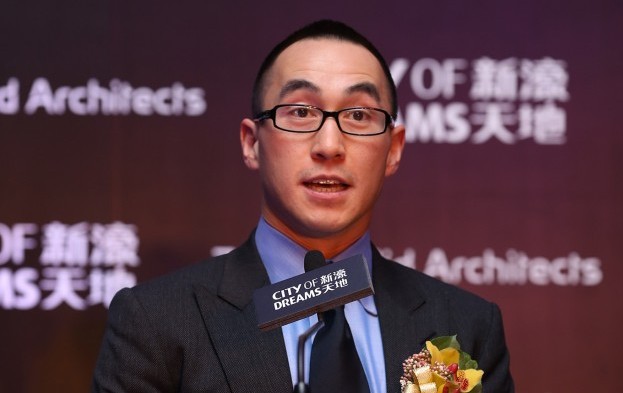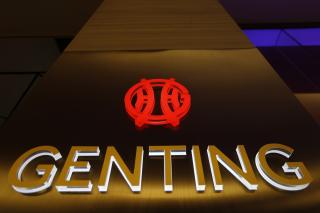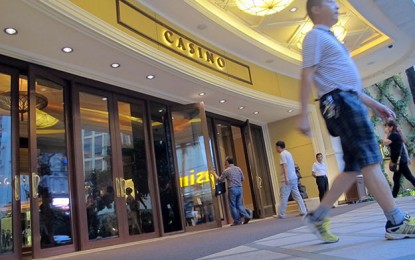CoD Manila on for Golden Week
May 20, 2014 Newsdesk Features, Latest News, Philippines, Top of the deck

Melco Crown (Philippines) Resorts Corp will open its City of Dreams Manila casino resort during China’s National Day holidays in the first week of October, GGRAsia has learned from three separate industry sources.
In earlier filings to the Philippine Stock Exchange the firm had simply said it was aiming to open the US$1.26 billion CoD Manila “in 2014”. But in the parent Melco Crown Entertainment Ltd’s latest earnings conference call on May 8, co-chairman Lawrence Ho Yau Lung (pictured) referred only to “later this year”.
GGRAsia approached MCE for a comment, but none was available by the time of publication. Were the property to open during Golden Week, it would clash with Global Gaming Expo 2014 in Las Vegas, possibly depressing attendance at that trade event among high-level executives from the Asian side of the industry.
But MCE’s thinking on an October opening for City of Dreams Manila – which sits slightly apart from the other projects in ‘Entertainment City’ at Manila Bay and around 30 minutes’ to an hour’s drive from Manila International Airport, depending on traffic – seems to be that it would help to maximise its appeal to Chinese tourists – especially the well-heeled sort that like to play VIP baccarat.
GGRAsia has been told the management has been working to try and secure deals with Macau junket operators to supply players to CoD Manila.
Earnings before interest, taxation, depreciation and amortisation from resort operations were due to be split 50:50 between Melco Crown unit MCE Leisure and its local partner Belle Corp according to an October 2012 filing to the Hong Kong Stock Exchange.
The parent company Melco Crown Entertainment would therefore need to see good volume of roll from any VIPs playing in Manila to ensure that its returns are superior to what it could achieve simply by serving those same VIPs in Macau. Attracting volume from Macau junkets might be achievable because of a competitive gaming tax regime in the Philippines at time when the Chinese government’s grip on the Macau VIP market appears to be getting stronger.
Safety fears
Philippine regulator Pagcor announced on May 12 that it was cutting taxes on VIP and mass gambling by 10 percentage points for its private sector franchisees. That was in lieu of the decision in April 2013 by the country’s Bureau of Internal Revenue to charge those franchisees 30 percent corporate income tax. Pagcor didn’t say however how long the gaming tax break would last.
For now though, it means tax on the VIP gross will be only five percent, while tax on mass market table bets will be only 15 percent, compared to Macau’s 35 percent, plus four percent for community causes, making an effective rate of 39 percent.
The Chinese mainland’s National Day holiday – marking the founding of the People’s Republic of China in 1949 – is officially a three-day event inside China this year, with a work break from October 1 to 3 inclusive. But given that the official vacation falls in midweek this year, many ethnic Chinese inside and outside the country are expected to take time off from Saturday September 27, to Sunday October 5, making a nine-day holiday. That’s enough time either for Filipino Chinese to take a domestic leisure break with hotel stay in a Manila casino resort, or for Chinese tourists to fly over from the mainland, Taiwan, Hong Kong, Macau or Malaysia.
According to the Department of Tourism Philippines, in February 2014 – the most recent figures available – visitors from China, Hong Kong, Macau and Taiwan comprised only 17 percent of the 423,000 foreign tourists visiting the country that month.
That’s a modest performance, considering the proximity of those markets. The numbers from mainland China did however represent a near-11 percent year-on year growth from February 2013.
Fears about personal safety in the Philippines have been cited as putting a dampener on tourism demand generally. In August 2010, nine Hong Kong tourists died and seven were wounded after a disgruntled Philippine National Police officer hijacked a bus in Manila at gunpoint.
According to the World Economic Forum’s Travel & Tourism Competitiveness Index 2013, the Philippines was ranked 82nd out of 140 jurisdictions. Although it was judged the most improved country in the region overall, it was ranked only 103rd for safety and security.
Set against the marketing potential of China’s National Day as a launch date for City of Dreams Manila, is some unfortunate timing. In early May a Chinese businessman was shot during an apparent robbery attempt on a car passing through the border of the City of Manila district and outlying Pasay, where several of the new generation of privately-funded Manila casino resorts are located or under construction.
It was bad enough that one man, reportedly from Shenzhen, actually died. If it were possible to get any worse, the incident hit all the demographic bases for the very sort of Chinese gamblers that the Philippines is trying to attract. Also in the car according to Hong Kong’s Sunday Morning Post, was a visitor from Shanghai, one from Hong Kong, and one from Taiwan.
Perhaps of more concern for MCE is that adding more casino supply to the market has not expanded gaming revenue in the country by the margin that Pagcor had hoped.
In February Reuters reported that the country had missed Pagcor’s gaming revenue estimate by 12 percent in 2013. Pagcor nonetheless claimed the industry had generated the equivalent of US$2.2 billion in the period, which it said was 10 percent up on 2012.
Related articles
-
 Macau, Cambodia most feel loss of China...
Macau, Cambodia most feel loss of China...Oct 22, 2024
-
 Bloomberry new loan to aid earnings,...
Bloomberry new loan to aid earnings,...Oct 18, 2024
More news
-
 Pragmatic Play launches ‘Big Bass...
Pragmatic Play launches ‘Big Bass...Oct 22, 2024
-
 Bloomberry COO Thomas Arasi gets 9.3mln...
Bloomberry COO Thomas Arasi gets 9.3mln...Oct 22, 2024
Latest News
Oct 22, 2024
Macau and Cambodia – two Asia-Pacific casino markets among most reliant on Chinese visitors – are both feeling the absence of mainland VIP players, says an S&P Global Inc macro-view report on...Sign up to our FREE Newsletter
 (Click here for more)
(Click here for more)
Pick of the Day
”We target to have more gaming venues [in the Philippines] interested to host our slot games, plus some other electronic table games”
Eddie Au
Chief operating officer of LT Game
Most Popular
 Genting Singapore to wind up seven Japan units October 21, 2024
Genting Singapore to wind up seven Japan units October 21, 2024  Macau Oct 1-20 GGR US$1.8bln, as past week slowed: JPM October 21, 2024
Macau Oct 1-20 GGR US$1.8bln, as past week slowed: JPM October 21, 2024  AGI to invest US$300mln in Boracay scheme with casino October 21, 2024
AGI to invest US$300mln in Boracay scheme with casino October 21, 2024





